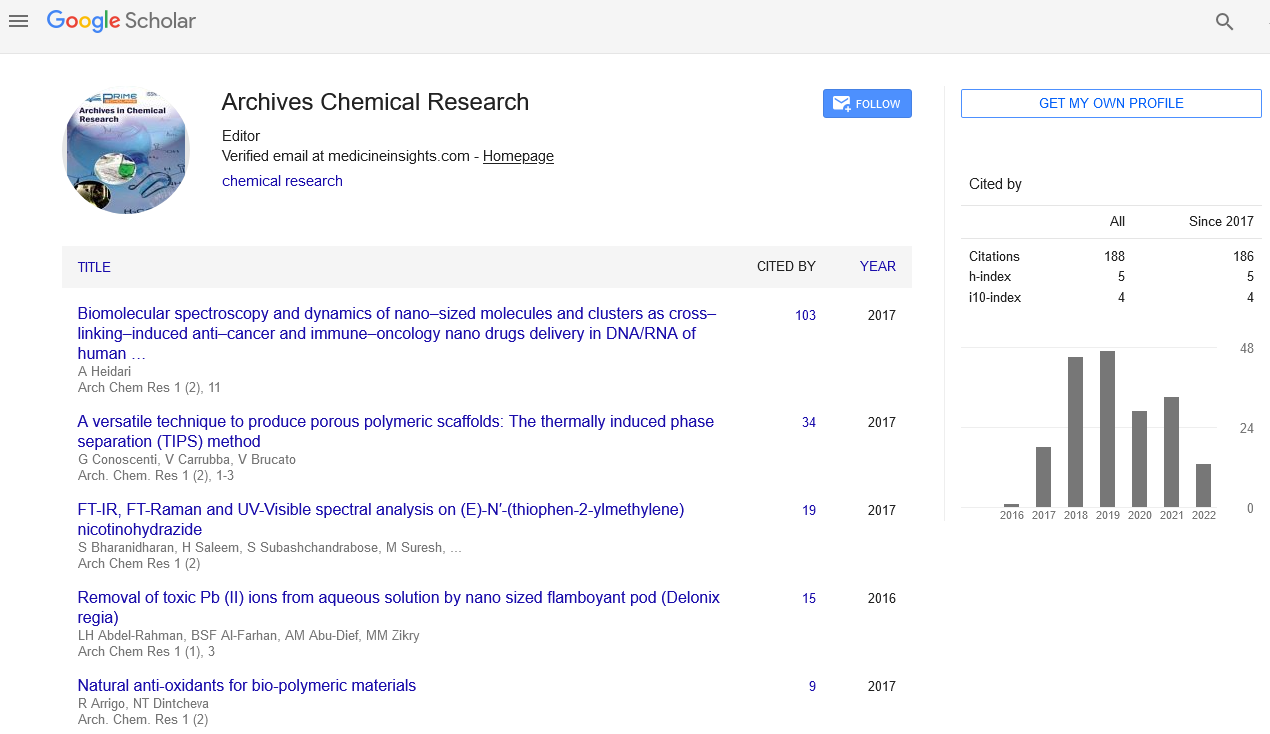Banglin Deng*
College of Mechatronics and Control
Engineering, Shenzhen University,
Shenzhen 518060, China
- *Corresponding Author:
- Banglin Deng
College of Mechatronics and Control
Engineering, Shenzhen University, Shenzhen
518060, China
E-mail: dengbanglin123@126.com
Received Date: October 13, 2021; Accepted Date: October 20, 2021; Published Date:October 27, 2021
Citation: Deng B (2021) How to deal with
Scale-up challenges of Chemistry?. Arch
Chem Res. Vol.4 No.4:23
Commentary
One of the most important challenges in synthetic chemistry is scaling up small-laboratory syntheses to the manufacturing level, while also producing pure material during a reproducible process.
When a ‘molecule of interest’ is first synthesized during a lab on small scale, a chemist can work tirelessly tweaking reagents, catalysts, solvents, temperatures, concentration, isolation, purification and a spread of other variables until the reaction yields the desired product. As a molecule’s complexity grows, the synthetic challenges do as well. The chemical change is difficult enough when producing a couple of milligrams or grams but increases exponentially when a synthesis is delivered to the manufacturing level!
Our process chemistry group consists of chemists whose specialties are the considerations and precautions needed to transfer an artificial route from the tiny, lab bench process level to the multi-kilo or metric ton scale.
When a molecule of interest is first proposed, the initial synthesis to the target often uses any reagents or catalysts or conditions that will result in a molecule of the desired purity. However, there should be scale-up obstacles thanks to cost, toxicity, general safety or other unexpected factors. We know a reaction that works well on small scale doesn't always translate well under scale-up. That’s where our process chemistry group steps in to think critically about the synthesis and convert it to a secure and economical manufacturing process.
The Adesis team has a passion for chemistry; respected for their brilliance and openness to collaboration and adapting. To keep this relationship strong, we work on creating an environment that encourages them to stay – and that they do. We don’t take that for granted. There is a proverb we've about our employees: we would like to ‘hire and retire them’ here at Adesis. We support this objective by embracing a culture founded on ethics, integrity, values, family, transparency, speed, safety and trust. Also, by believing that a various and inclusive work environment is important to the expansion and sustainability of our business. Then, we glance for the simplest people to hitch our extraordinary group. A team of individuals with the skill and expertise to figure anywhere within the world, yet they prefer to occupy Adesis.
Reagent, catalyst or solvent choice: On small scale it's going to be economically feasible to use certain reagents, catalysts, and solvents but if many kilograms of an upscale reagent or catalyst or solvent are required a process chemist may seek alternatives to lower the economic impact of producing. This is also true for safety purposes since some reagents become too toxic or dangerous when used on larger scales.
Reaction conditions, isolation, and purification: A small-scale reaction that's conducted under harsh conditions, like very high or low temperatures and pressures, is simpler to manage and control than on larger scale. This makes the reaction conditions an integral consideration for process chemists when discerning the way to best scale-up a reaction to the manufacturing level. The same is true for isolation and purification. To isolate a smallscale molecule through preparatory HPLC or maybe traditional chromatography can add an exponential expense when performing those purifications on the manufacturing level.
It is the work of the Adesis process chemist to think about the initial small scale reaction conditions as they carefully tailor the reaction in order that the molecule of interest can be delivered to the manufacturing level, economically, reproducibly, and safely.

